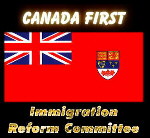
Immigration Legislative Advisory Review, 300 Slater Street, Journal Tower North, 6th Floor, Ottawa, Ontario, K1A 1L1
Dear Sirs: It is with some consternation that we learned of the review you are undertaking just this week from the Internet. As the publisher of The Canadian Immigration Hotline, a monthly critique of immigration trends, we thought we might have been advised of your deliberations and asked to submit a presentation. We are one of Canada’s longest standing opponents of the massive changes wrought by the immigration revolution of 1965. On your webpage you indicate: “The advisory group will consult within the government and with outside stakeholders.” A review of the persons consulted in various cities around Canada would suggest that it has been the immigration lobby talking to the immigration lobby. For instance, why did your Vancouver round table not include North Shore News columnist and immigration critic Doug Collins, or former Immigration Board member Charles Campbell, another voice skeptical of current immigration policies? The following are some general principles that we recommend for your consideration:
- 1. Canada’s immigration policy must reflect the will of the majority. In a democracy, a policy can only result in social peace, respect and acceptance if it is supported by the majority. However, all scholars of the immigration question agree that the changes wrought by the 1965 immigration revolution are widely unpopular. Canadians did not then nor do they now clamour for a turning away from our traditional sources of immigration to massive influxes from the Third World. Just one example is the Gallup Poll of June, 1987, which found that 77.6 per cent of Canadian oppose immigration that will upset the ethnic balance of their community. That, in fact, is what we have had for the past 30 years. Whole neighbourhoods in Vancouver, Toronto, and Montreal have seen their traditional population swamped and replaced. Immigration policy should be determined after a full and public debate by a binding national referendum. 2. According to a Forum Canada Research poll taken in May, 1995, 59 per cent of Canadians favour a five year moratorium on immigration. With unemployment officially still well over 9 per cent — involving some 1.4 million Canadians — we simply do not now need more immigrants. We recommend a five year moratorium on immigration to allow us to absorb the flood of the past three decades. During this time, there can be a thoughtful national reassessment and debate, culminating in a referendum to set future immigration policy. 3. No person should be considered for refugee status, except through application at a Canadian mission abroad.
- Thus, the person can be assessed and his/her identity determined. The present policy of permitting people to fly in, say “I’m a refugee”, and then be eligible for medicare, welfare, and legal aid over the years it takes to assess their claim is a costly scandal. The recent influx of Gypsies is just the latest in a long series of incidents where Canada is seen as an easy touch. The result has been colossal welfare costs and the entry of a considerable number of criminals or poorly qualified people, with few language or job skills. 4. Canadian citizenship is a precious right, not an automatic entitlement for having parked oneself here for three years. No one who is not fluent in either English or French should be granted citizenship. There should be a five year waiting period and the prospective citizen must be able to show an unblemished criminal record and pass a written test in English or French demonstrating a knowledge of Canadian institutions. 5. Children born of non-citizens, especially illegals, should not be given Canadian citizenship. 6. Immigration is a selfish act.
- No one leaves his/her homeland to better another country. People always migrate to a land they perceive to be better than their own. As proof, we note few people lining up in front of the North Korean or Haitian embassies to emigrate to those sorry lands. Thus, Canada as the host country must carefully assess potential immigrants to be certain that they can make a contribution to Canada and that they are, in fact, committed to Canadian values. 7. Pursuant to point 6, family reunification should not be a value of Canada’s immigration policy. Beyond a qualified immigrant’s spouse and children there should be no right to sponsor other family members.Each should have to qualify on his/her own.
We would be happy to elaborate on these and other concerns in the appropriate forum.
